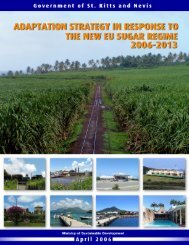- Page 2 and 3:
Jobs
- Page 4 and 5:
Jobs
- Page 6 and 7:
Contents Foreword xiii Acknowledgme
- Page 8 and 9:
Contents vii Countries with high yo
- Page 10 and 11:
Contents ix 8.8 Kurzarbeit has beco
- Page 12:
Contents xi Maps 1 Only in some cou
- Page 15 and 16:
xiv FOREWORD which jobs would do th
- Page 17 and 18:
xvi ACKNOWLEDGMENTS through its Pol
- Page 19:
xviii Abbreviations and Data Notes
- Page 22 and 23:
Moving jobs center stage 3 To many,
- Page 24 and 25:
Moving jobs center stage 5 ular wag
- Page 26 and 27:
Moving jobs center stage 7 primary
- Page 28 and 29:
Moving jobs center stage 9 jobs can
- Page 30 and 31:
Moving jobs center stage 11 ploymen
- Page 32 and 33:
Moving jobs center stage 13 FIGURE
- Page 34 and 35:
Moving jobs center stage 15 In 2008
- Page 36 and 37:
Moving jobs center stage 17 two per
- Page 38 and 39:
Moving jobs center stage 19 • Res
- Page 40 and 41:
Moving jobs center stage 21 MAP 1 O
- Page 42 and 43:
Moving jobs center stage 23 lead to
- Page 44 and 45:
Moving jobs center stage 25 A malfu
- Page 46 and 47:
Moving jobs center stage 27 develop
- Page 48 and 49:
Moving jobs center stage 29 ues sur
- Page 50 and 51:
Moving jobs center stage 31 Policie
- Page 52 and 53:
Moving jobs center stage 33 can be
- Page 54 and 55:
Moving jobs center stage 35 ability
- Page 56 and 57:
Moving jobs center stage 37 earning
- Page 58 and 59:
Moving jobs center stage 39 Notes 1
- Page 60 and 61:
Moving jobs center stage 41 128. Ch
- Page 62 and 63:
Moving jobs center stage 43 Chen, S
- Page 64 and 65:
Moving jobs center stage 45 ——
- Page 66 and 67:
Moving jobs center stage 47 Shifera
- Page 68 and 69:
The jobs challenge 49 A job, but no
- Page 70 and 71:
The jobs challenge 51 2008. Of thes
- Page 72 and 73:
The jobs challenge 53 FIGURE 1.4 Mo
- Page 74 and 75:
The jobs challenge 55 FIGURE 1.5 La
- Page 76 and 77:
The jobs challenge 57 BOX 1.3 The t
- Page 78 and 79:
The jobs challenge 59 FIGURE 1.8 Wa
- Page 80 and 81:
The jobs challenge 61 FI G U R E 1.
- Page 82 and 83:
QUESTION1 What is a job? The world
- Page 84 and 85:
The jobs challenge 65 What is not a
- Page 86 and 87:
The jobs challenge 67 © Sebastião
- Page 88 and 89:
The jobs challenge 69 43. Blanchflo
- Page 90 and 91:
The jobs challenge 71 and John Stra
- Page 92 and 93:
The jobs challenge 73 1983-2008.”
- Page 94 and 95:
Introduction to Part 1 Economic dev
- Page 96 and 97:
Jobs and living standards 77 BOX 2.
- Page 98 and 99:
Jobs and living standards 79 FIGURE
- Page 100 and 101:
Jobs and living standards 81 FIGURE
- Page 102 and 103:
Jobs and living standards 83 BOX 2.
- Page 104 and 105:
Jobs and living standards 85 The la
- Page 106 and 107:
QUESTION2 Growth strategies or jobs
- Page 108 and 109:
Jobs and living standards 89 erated
- Page 110 and 111:
Day laborer in a pineapple plantati
- Page 112 and 113:
Jobs and living standards 93 52. Ch
- Page 114 and 115:
Jobs and living standards 95 Giles,
- Page 116 and 117:
Jobs and living standards 97 Stutze
- Page 118 and 119:
Jobs and productivity 99 BOX 3.1 Wh
- Page 120 and 121:
Jobs and productivity 101 FIGURE 3.
- Page 122 and 123: Jobs and productivity 103 FIGURE 3.
- Page 124 and 125: Jobs and productivity 105 FIGURE 3.
- Page 126 and 127: Jobs and productivity 107 FIGURE 3.
- Page 128 and 129: Jobs and productivity 109 FIGURE 3.
- Page 130 and 131: Jobs and productivity 111 FIGURE 3.
- Page 132 and 133: Jobs and productivity 113 TABLE 3.1
- Page 134 and 135: Jobs and productivity 115 FIGURE 3.
- Page 136 and 137: Jobs and productivity 117 such as n
- Page 138 and 139: Jobs and productivity 119 Notes 1.
- Page 140 and 141: Jobs and productivity 121 86. Berge
- Page 142 and 143: Jobs and productivity 123 and Metad
- Page 144 and 145: Jobs and productivity 125 Jobs in T
- Page 146 and 147: Jobs and social cohesion 127 And pe
- Page 148 and 149: Jobs and social cohesion 129 FIGURE
- Page 150 and 151: Jobs and social cohesion 131 FIGURE
- Page 152 and 153: Jobs and social cohesion 133 BOX 4.
- Page 154 and 155: Jobs and social cohesion 135 BOX 4.
- Page 156 and 157: Jobs and social cohesion 137 The ex
- Page 158 and 159: Jobs and social cohesion 139 FIGURE
- Page 160 and 161: Jobs and social cohesion 141 the ob
- Page 162 and 163: Jobs and social cohesion 143 tional
- Page 164 and 165: Jobs and social cohesion 145 © Aye
- Page 166 and 167: Jobs and social cohesion 147 28. Fe
- Page 168 and 169: Jobs and social cohesion 149 Dudwic
- Page 170 and 171: Jobs and social cohesion 151 Sollet
- Page 174 and 175: Valuing jobs 155 cohesion. Data fro
- Page 176 and 177: Valuing jobs 157 BOX 5.2 Compliance
- Page 178 and 179: Valuing jobs 159 FIGURE 5.1 Views o
- Page 180 and 181: Valuing jobs 161 social value in th
- Page 182 and 183: Valuing jobs 163 BOX 5.5 Several da
- Page 184 and 185: Valuing jobs 165 FIGURE 5.4 Some ea
- Page 186 and 187: Valuing jobs 167 Productivity Spill
- Page 188 and 189: Valuing jobs 169 Policies to contai
- Page 190 and 191: Valuing jobs 171 FIGURE 5.10 Proxim
- Page 192 and 193: Valuing jobs 173 FIGURE 5.12 Gender
- Page 194 and 195: Valuing jobs 175 FIGURE 5.13 Relati
- Page 196 and 197: Valuing jobs 177 BOX 5.8 Manpower p
- Page 198 and 199: Valuing jobs 179 Notes 1. Glewwe 20
- Page 200 and 201: Valuing jobs 181 skills, have betwe
- Page 202 and 203: Valuing jobs 183 Bacolod, Marigee,
- Page 204 and 205: Valuing jobs 185 Hallegatte, Stepha
- Page 206 and 207: Valuing jobs 187 Matthias Arnold, J
- Page 208 and 209: Valuing jobs 189 Workers in Germany
- Page 210 and 211: Diverse jobs agendas 191 Formal emp
- Page 212 and 213: Diverse jobs agendas 193 The job st
- Page 214 and 215: Diverse jobs agendas 195 creation c
- Page 216 and 217: Diverse jobs agendas 197 Urbanizing
- Page 218 and 219: Diverse jobs agendas 199 have been
- Page 220 and 221: Diverse jobs agendas 201 TABLE 6.2
- Page 222 and 223:
Diverse jobs agendas 203 BOX 6.6 La
- Page 224 and 225:
Diverse jobs agendas 205 FIGURE 6.4
- Page 226 and 227:
Diverse jobs agendas 207 segmented
- Page 228 and 229:
Diverse jobs agendas 209 they would
- Page 230 and 231:
Diverse jobs agendas 211 contributi
- Page 232 and 233:
Diverse jobs agendas 213 moving awa
- Page 234 and 235:
Diverse jobs agendas 215 age group)
- Page 236 and 237:
QUESTION6 A targeted investment cli
- Page 238 and 239:
Diverse jobs agendas 219 challenges
- Page 240 and 241:
Diverse jobs agendas 221 that the p
- Page 242 and 243:
Diverse jobs agendas 223 Notes 1. P
- Page 244 and 245:
Diverse jobs agendas 225 128. Sawad
- Page 246 and 247:
Diverse jobs agendas 227 Finegan, T
- Page 248 and 249:
Diverse jobs agendas 229 Mallaby, S
- Page 250 and 251:
Diverse jobs agendas 231 WHO (World
- Page 252 and 253:
Connected jobs agendas 233 workers.
- Page 254 and 255:
Connected jobs agendas 235 M a p 7.
- Page 256 and 257:
Connected jobs agendas 237 impact o
- Page 258 and 259:
Connected jobs agendas 239 FIGURE 7
- Page 260 and 261:
Connected jobs agendas 241 supporti
- Page 262 and 263:
QUESTION7 Competing for jobs? Many
- Page 264 and 265:
Connected jobs agendas 245 Repúbli
- Page 266 and 267:
Connected jobs agendas 247 FIGURE 7
- Page 268 and 269:
Connected jobs agendas 249 Notes 1.
- Page 270 and 271:
Connected jobs agendas 251 Akamatsu
- Page 272 and 273:
Connected jobs agendas 253 Harrison
- Page 274 and 275:
Connected jobs agendas 255 Thomas,
- Page 276 and 277:
Introduction to Part 3 Most jobs ar
- Page 278 and 279:
Labor policies revisited 259 FIGURE
- Page 280 and 281:
Labor policies revisited 261 New da
- Page 282 and 283:
Labor policies revisited 263 The co
- Page 284 and 285:
Labor policies revisited 265 BOX 8.
- Page 286 and 287:
Labor policies revisited 267 BOX 8.
- Page 288 and 289:
Labor policies revisited 269 terven
- Page 290 and 291:
Labor policies revisited 271 BOX 8.
- Page 292 and 293:
Labor policies revisited 273 contri
- Page 294 and 295:
Labor policies revisited 275 tions
- Page 296 and 297:
QUESTION8 277 WORLD DEVELOPMENT REP
- Page 298 and 299:
Labor policies revisited 279 There
- Page 300 and 301:
Labor policies revisited 281 Notes
- Page 302 and 303:
Labor policies revisited 283 signal
- Page 304 and 305:
Labor policies revisited 285 ity Gr
- Page 306 and 307:
Labor policies revisited 287 Discus
- Page 308 and 309:
Labor policies revisited 289 Katz,
- Page 310 and 311:
Labor policies revisited 291 Robali
- Page 312 and 313:
Beyond labor policies 293 down. Lab
- Page 314 and 315:
Beyond labor policies 295 figure 9.
- Page 316 and 317:
Beyond labor policies 297 revealed
- Page 318 and 319:
Beyond labor policies 299 FIGURE 9.
- Page 320 and 321:
Beyond labor policies 301 gram cost
- Page 322 and 323:
Beyond labor policies 303 uted to s
- Page 324 and 325:
Beyond labor policies 305 European
- Page 326 and 327:
Beyond labor policies 307 BOX 9.3 I
- Page 328 and 329:
Beyond labor policies 309 FIGURE 9.
- Page 330 and 331:
Beyond labor policies 311 the coope
- Page 332 and 333:
QUESTION9 How to accelerate labor r
- Page 334 and 335:
Beyond labor policies 315 ployee’
- Page 336 and 337:
Beyond labor policies 317 FIGURE 9.
- Page 338 and 339:
Beyond labor policies 319 Notes 1.
- Page 340 and 341:
Beyond labor policies 321 116. Arou
- Page 342 and 343:
Beyond labor policies 323 Ann E. Ha
- Page 344 and 345:
Beyond labor policies 325 trategias
- Page 346 and 347:
Beyond labor policies 327 ———
- Page 348 and 349:
Glossary Jobs Jobs: While precise d
- Page 350 and 351:
Glossary 331 Environmental effects:
- Page 352 and 353:
Attanasio, Ajita Berar Awad, João
- Page 354 and 355:
Falco, Paolo, William Maloney, Bob
- Page 356 and 357:
Selected indicators General notes T
- Page 358 and 359:
Selected Indicators 339 reference p
- Page 360 and 361:
Selected Indicators 341 Table 1 Lab
- Page 362 and 363:
Selected Indicators 343 Table 1 Lab
- Page 364 and 365:
Selected Indicators 345 Table 1 Lab
- Page 366 and 367:
Selected Indicators 347 Table 1 Lab
- Page 368 and 369:
Selected Indicators 349 Table 2 Ski
- Page 370 and 371:
Selected Indicators 351 Table 2 Ski
- Page 372 and 373:
Selected Indicators 353 Table 3 Emp
- Page 374 and 375:
Selected Indicators 355 Table 3 Emp
- Page 376 and 377:
Selected Indicators 357 Table 4 Liv
- Page 378 and 379:
Selected Indicators 359 Table 4 Liv
- Page 380 and 381:
Selected Indicators 361 Table 5 Pro
- Page 382 and 383:
Selected Indicators 363 Table 5 Pro
- Page 384 and 385:
Selected Indicators 365 Table 6 Soc
- Page 386 and 387:
Selected Indicators 367 Table 6 Soc
- Page 388 and 389:
Selected Indicators 369 Table 7 Pol
- Page 390 and 391:
Selected Indicators 371 Table 7 Pol
- Page 392 and 393:
Selected Indicators 373 Table 8 Con
- Page 394 and 395:
Selected Indicators 375 ment. Perso
- Page 396 and 397:
Selected Indicators 377 cerning the
- Page 398:
Selected Indicators 379 Table 9 Mic
- Page 401 and 402:
382 INDEX manufacturing sector in,
- Page 403 and 404:
384 INDEX “meaningful” work, va
- Page 405 and 406:
386 INDEX as resource-rich country,
- Page 407 and 408:
388 INDEX labor laws and regulation
- Page 409 and 410:
390 INDEX agrarian economies, 193f
- Page 411 and 412:
392 INDEX Mexico cash transfer prog
- Page 413 and 414:
394 INDEX removing constraints by g
- Page 415 and 416:
396 INDEX migrant population in, 52
- Page 417 and 418:
398 INDEX as incentive to create go
- Page 419 and 420:
400 INDEX Uzbekistan inequality of
- Page 421 and 422:
ECO-AUDIT Environmental Benefits St
















